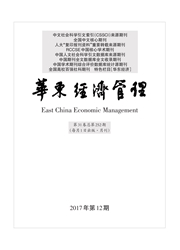

 中文摘要:
中文摘要:
金融资源配置在很大程度上决定了经济增长的速度和方式,因此金融资源配置效率不应仅包含反映经济增长速度的经济效率,还应包括体现经济增长方式转变和社会、经济、生态的可持续发展的“社会效率”与“生态效率”。文章在理论分析的基础上,运用DEA模型中的相关指标分别对我国金融资源配置的经济效率、社会效率和生态效率进行了测度,并运用Malmquist指数对效率变化进行了评价,结果显示:我国金融资源配置效率总体水平不高,区域间差异较明显,且表现出与经济发展水平具有一定相关性;同时,经济效率和生态效率总率上呈现上升趋势,但社会效率却呈现出下降趋势,表明我国金融资源的配置在不断优化,但经济发展的重点领域和薄弱环节需加强,
 英文摘要:
英文摘要:
The allocation of financial resources determines, to a great extent, the speed and mode of economie growth. Therefore,the allocation efficiency of financial resources should eover not only the economic efficiency which indicates the speed of economic growth, but also "social benefits" and "coo-efficiency" that reflect the transformed pattern of economic growth and the sustainable development of society ,economy and ecology. Based on the theoretical analysis, relevant index- es from DEA model are used to measure economic efficiency,social benefits and coo-efficiency of the allocation of finan- cial resources in China; Mahnquist index is also applied to assess the changes in efficiency. The results show that the over- all level of allocation efficiency of financial resources in China is not high ,the regional differences are obvious, and the eco- nomic development level has certain relevance. Moreover,the economic efficiencv and eco-efficiency are generally upward trend, but the social efficiency is showing a downward trend, which indicates that the allocation of financial resources in China is constantly optimized, but the economic development of key areas and weak links need to be strengthened.
 同期刊论文项目
同期刊论文项目
 同项目期刊论文
同项目期刊论文
 期刊信息
期刊信息
